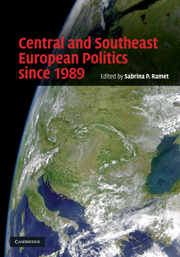Book contents
- Frontmatter
- Contents
- List of figures and maps
- List of tables
- Notes on the contributors
- Preface
- List of acronyms and abbreviations
- Guide to pronunciation of Central and Southeast European words
- 1 Central and Southeastern Europe, 1989
- 2 Central and Southeastern Europe, 2009
- Part 1 Introduction
- Part 2 Issues
- Part 3 Central Europe
- Part 4 Yugoslav Successor States
- 11 Slovenia since 1989
- 12 Politics in Croatia since 1990
- 13 Serbia and Montenegro since 1989
- 14 Bosnia and Herzegovina since 1990
- 15 Macedonia since 1989
- 16 Kosova: resisting expulsion and striving for independence
- Part 5 Southeastern Europe
- Part 6 Former Soviet republics
- Part 7 Present and future challenges
- Index
- References
16 - Kosova: resisting expulsion and striving for independence
Published online by Cambridge University Press: 05 June 2012
- Frontmatter
- Contents
- List of figures and maps
- List of tables
- Notes on the contributors
- Preface
- List of acronyms and abbreviations
- Guide to pronunciation of Central and Southeast European words
- 1 Central and Southeastern Europe, 1989
- 2 Central and Southeastern Europe, 2009
- Part 1 Introduction
- Part 2 Issues
- Part 3 Central Europe
- Part 4 Yugoslav Successor States
- 11 Slovenia since 1989
- 12 Politics in Croatia since 1990
- 13 Serbia and Montenegro since 1989
- 14 Bosnia and Herzegovina since 1990
- 15 Macedonia since 1989
- 16 Kosova: resisting expulsion and striving for independence
- Part 5 Southeastern Europe
- Part 6 Former Soviet republics
- Part 7 Present and future challenges
- Index
- References
Summary
In March 1989, Slobodan Milošević, the party chief in Serbia, engineered Kosova's loss of status as an autonomous province within Yugoslavia and its absorption into the Republic of Serbia. The Kosovar Albanians, who constituted more than 90% of the population of Kosova, protested the Serbian takeover. Later that year, Kosovar Albanian intellectuals founded the Democratic League of Kosova (LDK) and elected Ibrahim Rugova as leader. Through the 1990s Serbian power in Kosova became steadily more oppressive as Kosovar Albanians moved from the passive resistance advocated by Rugova and the LDK to more active resistance, culminating in the war for Kosova of 1998–9. At the end of the war, in June 1999, Kosova became a UN protectorate, still officially part of Yugoslavia, and when Yugoslavia ceased to exist in 2003, part of Serbia, but ruled by the United Nations Interim Administration Mission in Kosovo (UNMIK).
Thus, the history of Kosova since 1989 can be divided into two periods: the period of Serbian rule and Albanian resistance, and the period under UNMIK. In this chapter, I will discuss the institutional transformations of the two periods, economic issues, and interethnic relations of Kosovar Albanians and Serbs. I will also contextualize major events and ongoing problems. As for the communist past of Kosova, concern for it has been overshadowed by ethnic issues, nationalism, and the war, although socialist expectations from that time continue to exert influence.
- Type
- Chapter
- Information
- Central and Southeast European Politics since 1989 , pp. 358 - 376Publisher: Cambridge University PressPrint publication year: 2010
References
- 3
- Cited by



